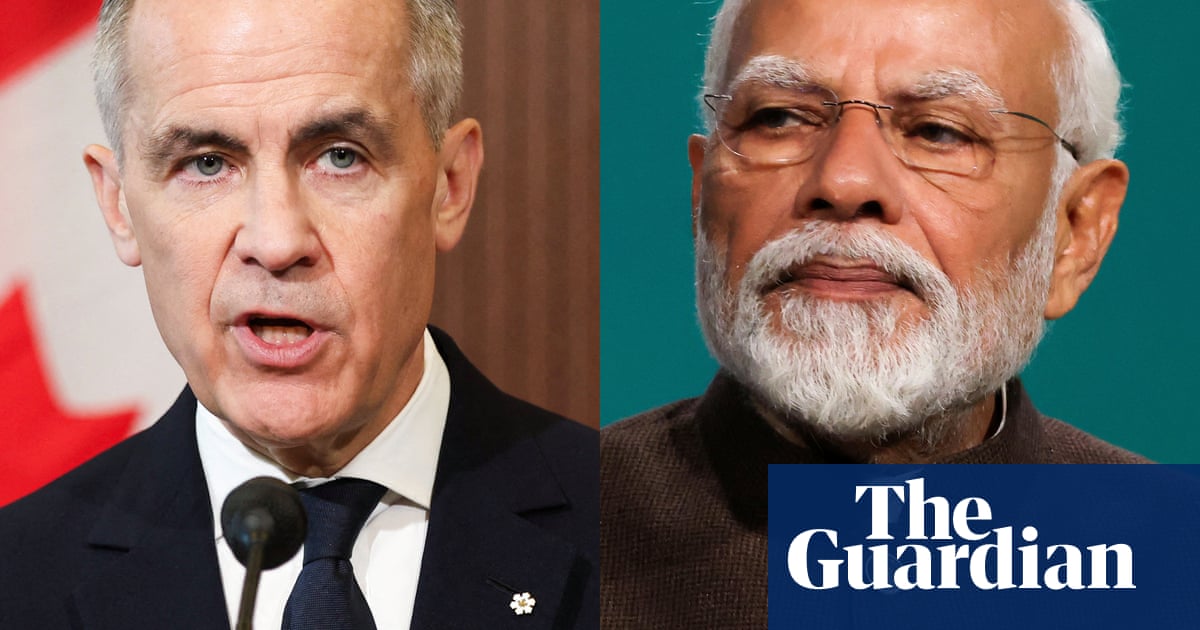CanadaandIndiaplan to share intelligence in a bid to combat the rising threat of international crime and extremism, according to a new report from Bloomberg, days before a meeting between the two countries’ leaders.
Canadian officials declined to comment on the report, which, if confirmed, would represent a dramatic shift in relations between the two nations which for nearly two years have been locked in a bitter diplomatic spat after Canada’s federal police agency concluded that Indiaplanned and ordered the murder a prominent Sikh activist on Canadian soil.
Under the intelligence-sharing deal , which is expected to be announced during the G7 summit inCanadalater this week, police from both countries will increase cooperation on transnational crime, terrorism and extremist activities. Canada has reportedly pushed for more work on investigations into extrajudicial killings.
Earlier this month, Canada’s prime minister, Mark Carney, was forced to defend his decision to invite the Indian prime minister, Narendra Modi, to the G7 summit in Alberta after Canada’s federal police’s said the shooting death of Hardeep Singh Nijjar wasorchestrated by the “highest levels” of the Indian government.
Carney said there was a “legal process that is literally under way and quite advanced inCanada”, following questions over his decision to invite Modi. Four Indian nationals living in Canada have been charged with Nijjar’s murder.
Carney also cited India’s status as the “fifth largest economy in the world, the most populous country in the world and central to supply chains”. But the decision did not sit well with lawmakers from British Columbia. A member of Carney’s Liberal caucus, Sukh Dhaliwal, met with the prime minister earlier this the week to express concern over the invitation.
“We as Canadians take pride to be a champion on human rights. We are the country of law and justice,” Dhaliwal, who represents the electoral district where Nijjar was killed, told the Canadian Press. “When it comes to protecting fundamental rights and serving justice for the victim, it is non-negotiable.”
Dhaliwal said that the prime minister was “alarmed about the issue” and would be “very strong in dealing” with the issue when speaking to his Indian counterpart.
Ever since former prime minister Justin Trudeau accused India of orchestrating the high-profile assassination of Nijjar, Ottawa and New Delhi have been locked in an worsening feud over the issue.
India temporarily stopped issuing in visas in Canada and, soon after, Canada expelled six senior diplomats, including the high commissioner, Sanjay Verma. India retaliated by ordering the expulsion of six high-ranking Canadian diplomats, including the acting high commissioner.
“The Indian government made a horrific mistake in thinking that they could interfere as aggressively as they did in the safety and sovereignty of Canada,” Trudeau told a public inquiry into foreign interference, adding that Canada had not wanted to “blow up” its valuable relationship with India. But he said afterNijjarwas killed, “we had clear and certainly now ever clearer indications that India had violated Canada’s sovereignty”.
The Bloomberg report, which underscores Carney’s attempts to mend relations with powerful nations, follows revelations that a suspected Indian government agent was surveilling former New Democratic party leader Jagmeet Singh as part of its network of coercion and intimidation.
According to Global News, the person, with suspected ties to both the Indian government andthe Lawrence Bishnoi gang implicated in Nijjar’s death, knew Singh’s daily routines, travel plans and family. When the RCMP realized there was a credible thread to this life, they placed the federal party leader under police protection.
“India targeted a Canadian politician on Canadian soil. That’s absolutely unprecedented. “As far as we’re concerned, that’s an act of war,” Balpreet Singh, a spokesperson for the World Sikh Organization, said after of the Global News report. “If Jagmeet Singh isn’t safe … what does it mean for the rest of us?”
